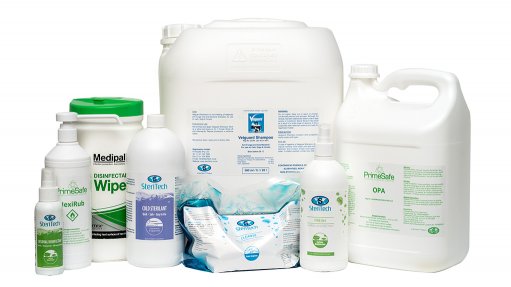
SOUGHT-AFTER SteriTech has increased its production capacity twenty-fold to meet demand across Africa
The demand for infection control solutions manufacturer SteriTech’s products has increased significantly across Africa since the Covid-19 outbreak, but so have the company’s lead times.
“Demand in the rest of Africa existed prior to the outbreak and was steadily growing at a rate just slightly faster than local demand. Since the global crisis, demand has increased so dramatically, locally and cross-border, that the local growth rate now matches that of cross-border countries,” says SteriTech technical director Melanie Kuster.
She highlights that, with few significant local manufacturers of its product types in South Africa’s immediate neighbouring countries, there is equal demand for most of the company’s products.
To meet demand, SteriTech has increased its production capacity twenty-fold and acquainted itself thoroughly with the additional International Trade Administration Commission of South Africa process required to export its products.
“However, export embargoes on our tariff codes have led to an extended and, thus far, challenging clearing process for all destinations,” notes Kuster.
Established in 1996 with a focus to supply the healthcare sector, which, in Africa, presents great potential for the sale of high-quality certified products, the company has distributors across South Africa, as well as in Lesotho, Botswana, Namibia, Swaziland, Mozambique, Zambia and Zimbabwe.
Namibia is the company’s most successful trade destination on the continent.
“This is purely owing to the success and drive of the trade partners that we have in Namibia. They have been significantly more targeted with their approach in identifying potential customers and their needs, and thus have shown greater success than those in other territories,” states Kuster.
She adds that, in general, dealing with cross-border nations is apleasure: “Healthcare staff are eager for knowledge, and always willing to engage on a professional and friendly level.”
Doing business in Africa has required research to understand the intricacies of the regulatory environment of specific countries and the import/export path required, she tells Engineering News, adding that SteriTech has overcome most challenges with time.
Kuster explains that, in most cases, working closely with SteriTech’s cross-border customers can resolve most regulatory and import/export factors.
“As logistical challenges can sometimes be impossible to address from outside the destination country, SteriTech relies on the customer to provide their own logistics and clearing solutions where necessary.”
However, the significant distances between SteriTech and three African countries that have approached the company since the start of the outbreak have resulted in manufacturing partnerships, rather than export/import relationships, being considered.